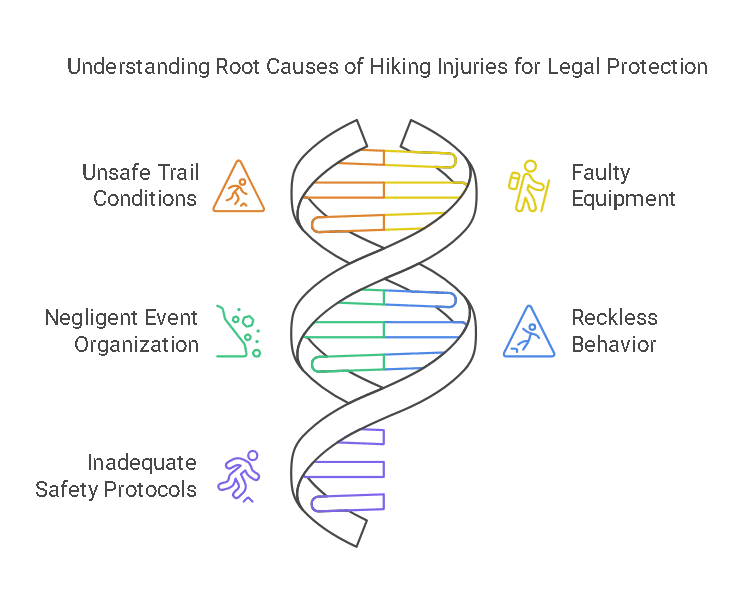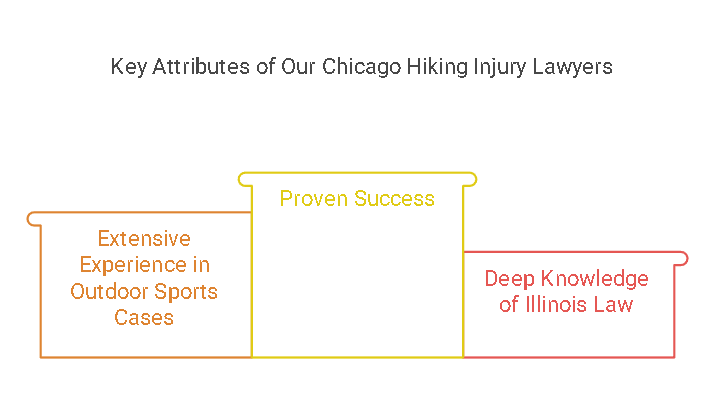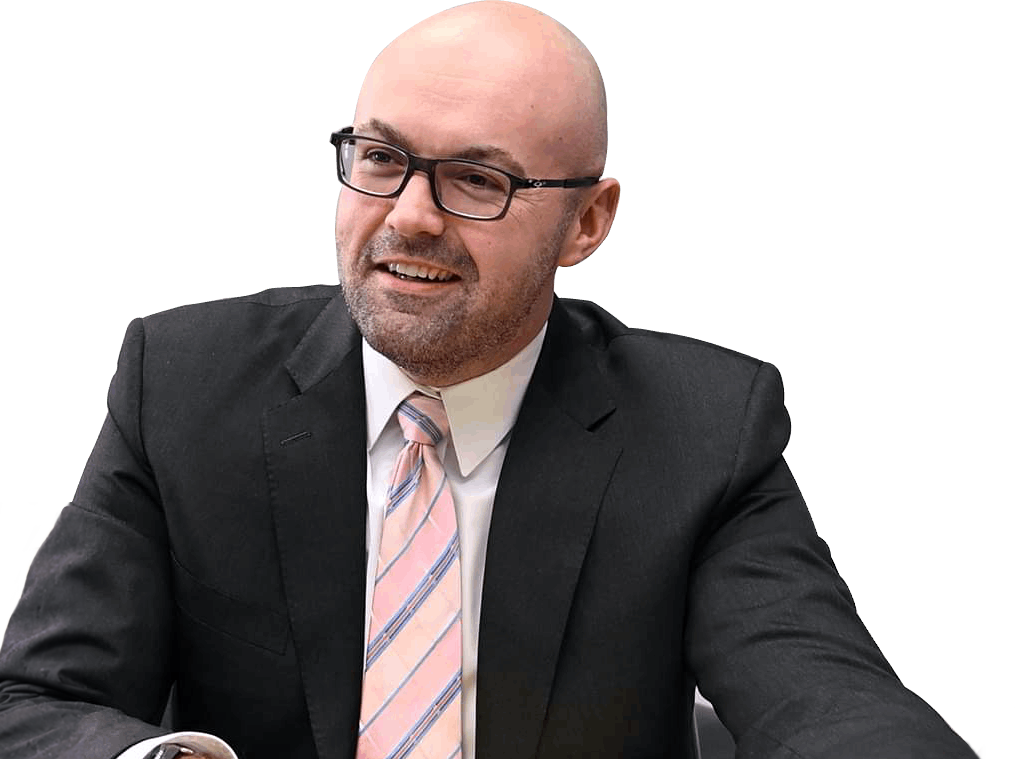Hiking is a sport that attracts athletes, nature lovers, and competition enthusiasts alike. However, the challenges of rough terrains, unpredictable weather, and inadequate safety measures often lead to serious injuries. If you are participating in organized sports events, the aftermath of an injury can be overwhelming, affecting your health, finances, and overall well-being.
We have the most experienced hiking injury lawyers in Chicago here to provide comprehensive legal assistance and help you navigate the complexities of your case.
How Our Hiking Injury Lawyers Can Help You
Recovering from a hiking injury requires more than medical care—it demands experienced legal advocacy to uphold your rights. Chicago Injury Lawyer is dedicated to ensuring you receive the justice and compensation you deserve. Here’s how we assist:
- Thorough Evidence Collection: We gather all relevant evidence, including accident reports, medical records, trail conditions, photos, witness testimonies, and available video footage. This meticulous approach strengthens your claim.
- Expert Consultations: Our skilled attorneys collaborate with outdoor sports experts, medical professionals, and safety analysts to clarify complex issues. Their insights ensure your case is built on a strong foundation of expert credibility.
- Pinpointing Liability: It is crucial to determine who is responsible. Whether it’s the organizers of a hiking competition, equipment manufacturers, or property owners, we analyze every detail to identify negligence.
- Comprehensive Damage Assessment: We calculate the full extent of your losses, from medical bills and lost wages to emotional suffering and future care needs, ensuring you secure fair compensation.
- Strategic Negotiations with Insurance Companies: Dealing with insurance companies can be challenging, especially when they attempt to minimize your claim. Our experienced lawyers handle all communications with insurers, ensuring your case is presented effectively. We use our legal expertise to negotiate a settlement that reflects the extent of your injuries and losses, sparing you the stress of navigating the process independently.
- Aggressive Representation in Court: While many hiking injury cases are resolved through negotiations, some require litigation to achieve justice. Our skilled trial attorneys are prepared to advocate for you if a fair settlement cannot be reached.
Common Hiking Injuries in Chicago
Hiking injuries can be severe, often leaving victims with long-term challenges. These injuries commonly include:
- Head Injuries: Slips, falls, or being struck by falling rocks can result in concussions, skull fractures, or traumatic brain injuries, which require extensive treatment.
- Fractures and Sprains: Uneven terrain or loose rocks can lead to twisted ankles, broken bones, or torn ligaments, leaving athletes sidelined for months.
- Back and Spinal Injuries: Heavy backpacks or falls can cause spinal compression or herniated discs, leading to chronic pain or even paralysis.
- Heat Exhaustion and Hypothermia: Chicago’s variable weather conditions can expose hikers to severe dehydration, heatstroke, or dangerously low body temperatures.
- Animal Attacks or Insect Bites: Encounters with wildlife or poisonous insects during hikes can result in infections, allergic reactions, or other serious medical complications.
Why Hiking Injuries Happen
Understanding the root causes of hiking injuries is essential for building a strong legal case. Our attorneys investigate these common factors:
- Unsafe Trail Conditions
Poorly maintained trails, uneven surfaces, or missing warning signs can lead to preventable accidents. For example, a broken handrail on a mountain path may result in a life-altering fall.
- Faulty Equipment
Defective hiking gear, such as broken trekking poles, unreliable backpacks, or unsafe climbing harnesses, often causes serious injuries. Manufacturers must ensure their products meet safety standards.
- Negligent Event Organization
Participants are exposed to more significant risks when poorly managed sports events or hiking competitions. Inadequate first-aid availability or unclear trail markings can exacerbate injuries.
- Reckless or Dangerous Behavior
Others’ negligence—such as reckless fellow hikers or untrained guides—can directly contribute to accidents. For example, a guide failing to warn about unstable ground risks the entire group.
- Inadequate Safety Protocols
Organizations responsible for maintaining trails or hosting events must implement safety measures, including proper signage, emergency response plans, and regular maintenance. A lack of these precautions can lead to serious injuries.

Compensation You May Be Entitled To for a Hiking Injury
Victims of hiking injuries in Illinois can seek compensation for various damages, including:
- Medical Expenses: Covering surgeries, therapy, and long-term treatment.
- Lost Wages: Recovering income lost due to time away from work.
- Pain and Suffering: Addressing the physical and emotional toll of your injuries.
- Future Costs: Accounting for ongoing medical care or lifestyle adjustments.
Chicago Injury Lawyer ensures all damages are accurately calculated to reflect the full scope of your losses.
Legal Protections for Hiking Injury Victims in Illinois
Several Illinois laws provide a framework for pursuing justice in hiking injury cases:
Personal Injury Act
The Personal Injury Act allows individuals injured due to negligence to seek compensation. This may involve property owners, event organizers, or equipment manufacturers for hiking injuries. Claims must be filed within two years of the injury.
Workers’ Compensation Act
Illinois has a Workers’ Compensation Act that provides benefits for work-related injuries for those employed in hiking related events. A claim must be filed within three years of the injury. The act covers medical expenses, lost wages, and disability benefits without requiring proof of negligence.
Wrongful Death Act
The Wrongful Death Act allows families to seek compensation when a loved one dies due to negligence. It covers funeral expenses, loss of companionship, and financial support the deceased would have provided. A wrongful death claim must be filed within two years from the date of death.
Determining Liability in Hiking Injury Cases
Pinpointing who is at fault is essential for a successful claim. Possible responsible parties include:
- Event Organizers: For failing to provide safe trails or clear instructions during competitions.
- Property Owners: For neglecting to maintain trails or fix hazards.
- Equipment Manufacturers: For producing defective or unsafe hiking gear.
- Other Hikers or Guides: For reckless or negligent behavior.
Our hiking injury attorneys in Chicago conduct thorough investigations to establish liability and build a compelling case.
Why Our Chicago Hiking Injury Lawyers Stand Apart
Selecting the right legal team can make all the difference in your case. Here’s why our firm stands out:
1. Extensive Experience in Outdoor Sports Cases: We have experience handling personal injury claims involving hiking and other outdoor sports injuries.
2. Personalized Attention: Every case is unique. We tailor our approach to meet your specific needs and goals.
3. Proven Success: Our track record includes significant settlements and verdicts for injury victims.
4. Deep Knowledge of Illinois Law: We leverage our expertise in state laws to ensure your case is handled precisely.
5. Client-Focused Recovery: While we handle legal complexities, you can focus on healing and rebuilding your life.

Take Action Today
Time is critical for preserving evidence and filing your claim within the statute of limitations. Contact Chicago Injury Lawyer for a free consultation to discuss your case.
Let our Chicago hiking injury lawyers handle the legal battles while you focus on recovery. Together, we’ll fight for the compensation and justice you deserve.
Frequently Asked Questions
1. How long do I have to file a hiking injury claim in Illinois?
You typically have two years from the date of the injury to file a claim.
2. What compensation can I expect for a hiking injury?
Compensation can include medical bills, lost wages, pain and suffering, and long-term care costs.
3. When should I contact a lawyer after a hiking injury?
Contacting a lawyer as soon as possible is best to protect your legal rights and gather crucial evidence for your case.



